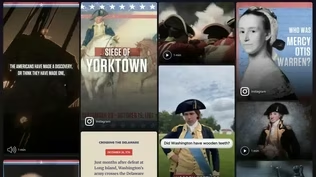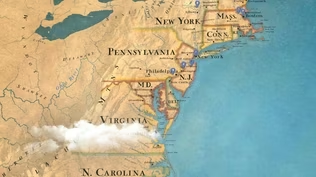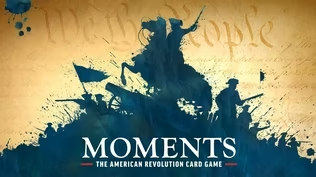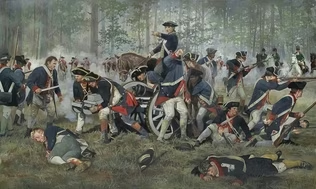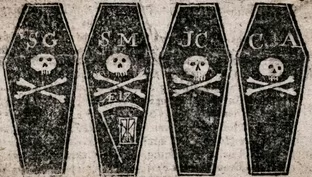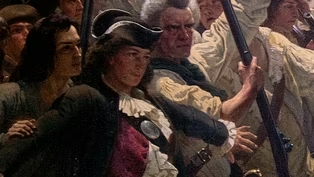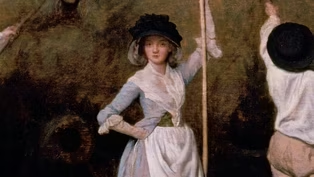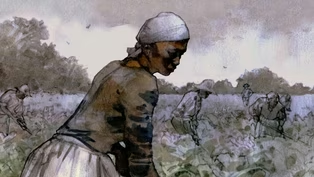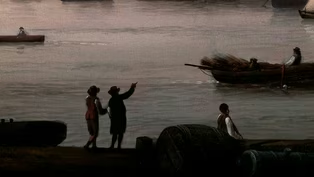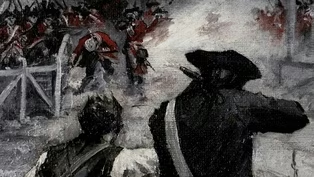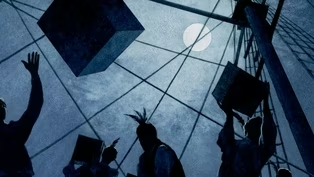
How Land, Taxes and Rebellion Sparked the American Revolution
Clip: Episode 1 | 7m 28sVideo has Closed Captions
The Stamp Act and taxes on American colonists lead to unrest and threaten to cause a revolution.
To reduce debt suffered from the Seven Years' War, Britain levies several new taxes on American colonists. Unrest grows as colonists fear that giving into these new taxes will open the floodgates to even harsher taxes. Whipped up by pamphleteers and influential figures like Samuel Adams and Patrick Henry, mobs of American colonists take to the streets to intimidate tax collectors and troops.
Problems playing video? | Closed Captioning Feedback
Problems playing video? | Closed Captioning Feedback
Episodes presented in 4K UHD on supported devices. Corporate funding for THE AMERICAN REVOLUTION was provided by Bank of America. Major funding was provided by The Better Angels Society and...

How Land, Taxes and Rebellion Sparked the American Revolution
Clip: Episode 1 | 7m 28sVideo has Closed Captions
To reduce debt suffered from the Seven Years' War, Britain levies several new taxes on American colonists. Unrest grows as colonists fear that giving into these new taxes will open the floodgates to even harsher taxes. Whipped up by pamphleteers and influential figures like Samuel Adams and Patrick Henry, mobs of American colonists take to the streets to intimidate tax collectors and troops.
Problems playing video? | Closed Captioning Feedback
How to Watch The American Revolution
The American Revolution is available to stream on pbs.org and the free PBS App, available on iPhone, Apple TV, Android TV, Android smartphones, Amazon Fire TV, Amazon Fire Tablet, Roku, Samsung Smart TV, and Vizio.
Buy Now
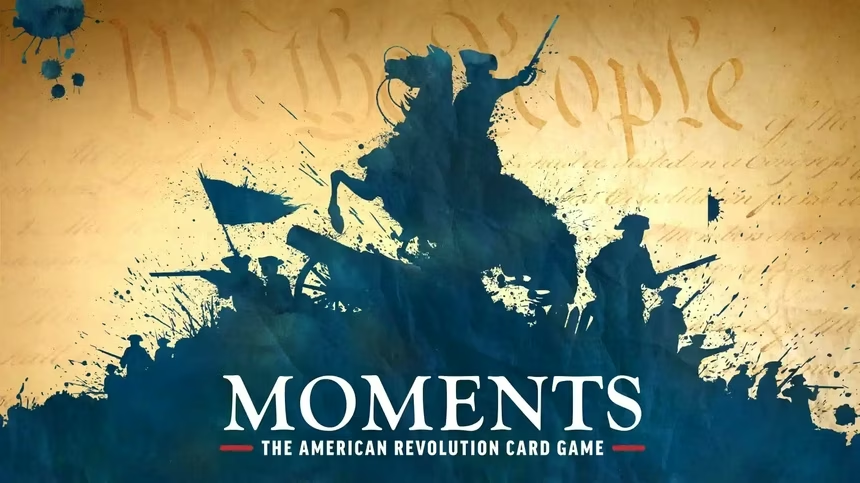
MOMENTS: The Revolutionary War Card Game
Use your knowledge of Revolutionary-era moments to build a timeline of real historical events.Providing Support for PBS.org
Learn Moreabout PBS online sponsorshipYears of war on 4 continents had doubled the national debt.
Britain was in the midst of a postwar depression, and British consumers were already burdened with higher taxes than were the subjects of any other European monarch.
The average British subject paid 26 shillings a year in taxes; the average New Englander paid just one.
So, some bright spark has the idea, "Well, let's tax the American colonists."
Right?
They should pay their share because, after all, we fought the war for them, and this is to defend them.
Narrator: In 1764, the Prime Minister, George Grenville, proposed a series of 3 parliamentary statutes, all meant to make the colonies help pay for their own defense.
The Currency Act, which forbade the colonists from issuing their own money, angered the tobacco-growing gentry of Virginia, who were especially hard-hit.
The Sugar Act imposed taxes on imports from the Caribbean, and to enforce it, the British Navy dispatched 44 ships to stop smuggling, enraging New Englanders, whose economy had long profited from it.
The rest of the colonies were largely unaffected.
London assumed Americans were too disunited, too divided by self-interest, to ever be able to present a united front.
But now, Grenville introduced a third tax-- the Stamp Act.
It would affect nearly every colonist in every colony.
No one would be able to obtain a license or a loan, transfer land or draft a will, earn a diploma, purchase a newspaper, or even buy a deck of cards unless it was printed or written on English-made paper that bore a stamp embossed by the Royal Treasury, for which they would have to pay.
For the very first time, Parliament planned to tax the 13 colonies directly.
The Stamp Act was scheduled to go into effect on November 1, 1765.
Taylor: Colonists said, "No taxation without representation."
What they meant was, no taxation except by our elected Legislature, here in our particular colony.
These taxes were very small, but the fear was, "If we give into this precedent, "if we pay the small Stamp Tax now, what will they do in the future?"
[Gavel banging] Narrator: In the Virginia House of Burgesses, Patrick Henry introduced a series of resolutions asserting that only the General Assembly of that colony had the "right and power to lay taxes" on its people.
Henry went on to declare that just as Julius Caesar had his assassin Brutus, George III should understand that some American resister was sure "to stand up in favor of his country."
When some delegates shouted "Treason!"
others who were present remembered he responded, "If this be treason, make the most of it!"
[Gavel banging rapidly] In Boston, 42-year-old Samuel Adams helped rally the opposition against implementation of the Stamp Act.
A failure as a brewer and as a collector of local taxes, Adams was a master of propaganda.
His mission, he once explained, was to "keep the attention of [my] fellow-citizens awake to their grievances."
Voice: If our trade may be taxed, why not our lands?
Why not the produce of our lands and everything we possess or make use of?
If taxes are laid upon us in any shape without our having a legal representation where they are paid, are we not reduced from the character of free subjects to the miserable state of tributary slaves?
[Samuel Adams] Woman: In terms of masters of communication, Samuel Adams was really up there.
He has an amazing ability to translate a concept into easily digested words.
And, therefore, to make, um, what seem--what could seem like fairly abstract ideas very vital and very urgent, and he's tireless.
So, he's able to produce page after page after page, new offenses, new crimes, new injustices.
Narrator: Pamphleteers took up the cause, declaring the Stamp Act illegitimate.
Most of the colonies' 24 weekly newspapers-- the businesses that would be hit hardest--followed suit.
Those that didn't faced being shut down by their journeymen and apprentices.
Taylor: Newspapers are very important.
The colonial public is more literate than any other people in the world outside of Scandinavia.
There's also word of mouth, conversation, absolutely essential.
Man: It became very common to discuss how you govern people and how people are free.
These ideas had filtered into the general population.
Narrator: Those ideas now led to protests in the streets.
In Boston, in August of 1765, a crowd formed-- made up of men and a handful of women, free Blacks and runaway slaves, poorly paid or unemployed workers who resented the rich, and apprentices in their off-hours, just looking for trouble.
They hanged in effigy the local man designated to become distributor of stamps and went on to invade the home of the lieutenant governor, destroying everything in sight and carrying off all of his furniture and 900 British pounds in cash.
In Newport, Rhode Island, another mob surrounded the stamp distributor, forced him to resign, and to lead them in chants of "Property and Liberty."
In Charleston, South Carolina, White anti-Stamp Act protestors marched through the streets chanting, "Liberty!"
But when enslaved South Carolinians echoed their cries, frightened enslavers called out the militia to patrol the street.
The Maryland appointee was driven from Annapolis with only the clothes on his back.
By the time the Stamp Act was supposed to go into effect, none of the 13 colonies had an official in place willing to enforce it.
Schiff: Part of our Revolution I think we have largely sanitized.
I think we've forgotten much of the street warfare, of the anarchy, of the provocations that took place.
Voice: A black cloud seems to hang over us.
It appears to me that there will be an end to all government here, for the people are all running mad.
James Parker.
Video has Closed Captions
Clip: Ep1 | 7m 52s | A bloody clash between Bostonians and the British army leaves five dead in the Boston Massacre. (7m 52s)
Video has Closed Captions
Clip: Ep1 | 9m 39s | The American Revolution will be a war that will pit brother against brother – and birth a nation. (9m 39s)
Video has Closed Captions
Clip: Ep1 | 43s | A single shot echoes on Lexington Green, and the American Revolution begins. (43s)
Video has Closed Captions
Clip: Ep1 | 50s | A spark ignites—quiet, unstoppable. What follows changes everything. (50s)
How the Townshend Acts Fueled a Resistance Movement
Video has Closed Captions
Clip: Ep1 | 3m 11s | When the British imposed new taxes, women joined the Resistance Movement by the thousands. (3m 11s)
Liberty for Whom? Slavery, Protest and the Ideals of the Revolution
Video has Closed Captions
Clip: Ep1 | 7m 32s | The revolutionary ideals of liberty spread across the colonies while many suffer from enslavement. (7m 32s)
Rising Tensions Didn't Keep European Settlers from Coming to North America
Video has Closed Captions
Clip: Ep1 | 2m 56s | Thousands poured down the Great Wagon Road, eager to start a new life in North America’s interior. (2m 56s)
The Shot Heard ’Round the World: Lexington, Concord and the Start of War
Video has Closed Captions
Clip: Ep1 | 11m 39s | Tensions erupt as colonists confront the British Army at Lexington and Concord, beginning the war. (11m 39s)
Tea, Tar and Tyranny: How the Boston Tea Party Changed Everything
Video has Closed Captions
Clip: Ep1 | 9m 26s | Bostonians protest the newly passed Tea Act by dumping 46 tons of tea into the Boston Harbor. (9m 26s)
Providing Support for PBS.org
Learn Moreabout PBS online sponsorshipSupport for PBS provided by:
Episodes presented in 4K UHD on supported devices. Corporate funding for THE AMERICAN REVOLUTION was provided by Bank of America. Major funding was provided by The Better Angels Society and...

